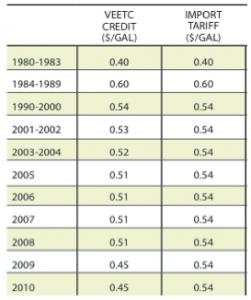 The debate about climate change change is over right? Wrong. At least according to authors Peter C. Glover and Michael J. Economides in their book, “Energy and Climate Wars.” The premise of the book is that politicians (aka Al Gore) green ideologues and media elites (What, me? Oh, I’m not a media elite.) are undermining the truth about energy and the climate and that is, well, to put it simply, is that it is not man made and carbon dioxide is not killing us quickly, or even slowly for that matter. It’s a hoax. A farce. A well orchestrated campaign designed to make a few rich in the new “carbon” or for some “clean/green economy” billionaires.
The debate about climate change change is over right? Wrong. At least according to authors Peter C. Glover and Michael J. Economides in their book, “Energy and Climate Wars.” The premise of the book is that politicians (aka Al Gore) green ideologues and media elites (What, me? Oh, I’m not a media elite.) are undermining the truth about energy and the climate and that is, well, to put it simply, is that it is not man made and carbon dioxide is not killing us quickly, or even slowly for that matter. It’s a hoax. A farce. A well orchestrated campaign designed to make a few rich in the new “carbon” or for some “clean/green economy” billionaires.
Now before you start clicking the button to post a comment, these are the views of the authors, not me. With that reminder, let me regale you with the overarching premise of the book. According to the authors, the book was written to give the reader a grasp on “the power politics of energy” or more specifically on the social ideology that increasingly influences and impacts you.
What is real, they say, is the threat on your energy security, but not for the reasons you believe (we’re running out of oil/peak oil, or that alternative energies will substitute for ‘dirty’ hydrocarbons). The REAL threats to your energy security are numerous one being alternative energy. In other words, our lifestyle as we know it (military, cars, homes, gadgets, etc.) is predicated on energy, energy that grew out of the Industrial Revolution. If we scale back on fossil-fuel based energy sources, oil, coal, natural gas, we are going to lose our way of life, our military will suffer, and ultimately, our energy security will be at risk.
The authors write, “Now let’s be clear before we go any further. Nobody is against research into new energy technologies, or demurs from the small-scale, purely supportive value of renewable energy sources from wind power (it may help keep your out-house lit) to solar power (expensive but it might give you hot or tepid bathwater) to geothermal use (maybe, but only in really cold countries). The problem is not the pin-prick, ad hoc uses to which they may be put, but the harnessing of larger projects on a commercially viable basis. On an industrial scale, they amount to nothing more than incredibly uneconomic business propositions that require the constant lifeline of government intervention and tax subsidy. The stark reality is that current technology offers no realistic replacing hydrocarbons for decades to come, if ever.” (All emphasis are those of the authors.)
Energy and Climate Wars reads a little like a Michael Crichton book (scientific thriller) dropped into the the plot of a John Le Carré global spy thriller, mixed with controversy of WikiLeaks adapted for the screen by the producer of the movie Wag the Dog.
If you question the whole global climate change movement, then you should consider reading this book. If you are one who believes that global climate change exists and that these two are the “alarmists” distracting us from the real crisis, you might want to read this book to. Why? It’s always easier to fight your enemies if you have their playbooks. Well, for the rest of you, consider a less controversial read…this one may give the weak of heart a stroke.
 Three fuel stations in Minnesota are now offering drivers of Flex Fuel Vehicles (FFVs) a chance to save money with frequent ethanol user cards.
Three fuel stations in Minnesota are now offering drivers of Flex Fuel Vehicles (FFVs) a chance to save money with frequent ethanol user cards.

 Michelle Kautz has been hired as the company’s Public Relations/Development Director to manage Protec’s marketing and public relations programs along with coordinating sales efforts targeted at fuel distributors and retailers.
Michelle Kautz has been hired as the company’s Public Relations/Development Director to manage Protec’s marketing and public relations programs along with coordinating sales efforts targeted at fuel distributors and retailers.  “We are excited to Have Michelle on our team. She will have an immediate positive impact due to her extensive experience in working on E85 programs with distributors and retailers,” noted Todd Garner, CEO for Protec Fuels. “With Michelle at Protec, we can now better serve our existing customers to help them grow their ethanol volumes and also expand our business more quickly through new retailers.”
“We are excited to Have Michelle on our team. She will have an immediate positive impact due to her extensive experience in working on E85 programs with distributors and retailers,” noted Todd Garner, CEO for Protec Fuels. “With Michelle at Protec, we can now better serve our existing customers to help them grow their ethanol volumes and also expand our business more quickly through new retailers.”



 During his Tuesday morning press call with agriculture reporters, Sen. Chuck Grassley (R-IA) once again defended the tax credit for ethanol being extended in the tax bill poised to be passed by the Senate.
During his Tuesday morning press call with agriculture reporters, Sen. Chuck Grassley (R-IA) once again defended the tax credit for ethanol being extended in the tax bill poised to be passed by the Senate. 
